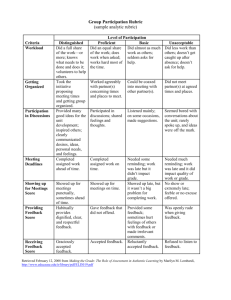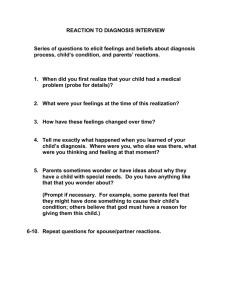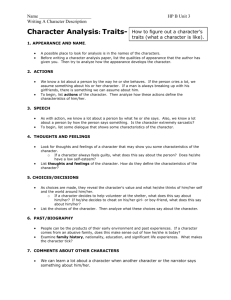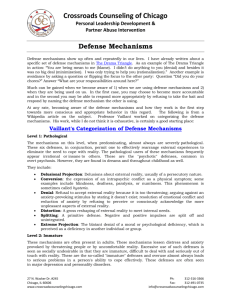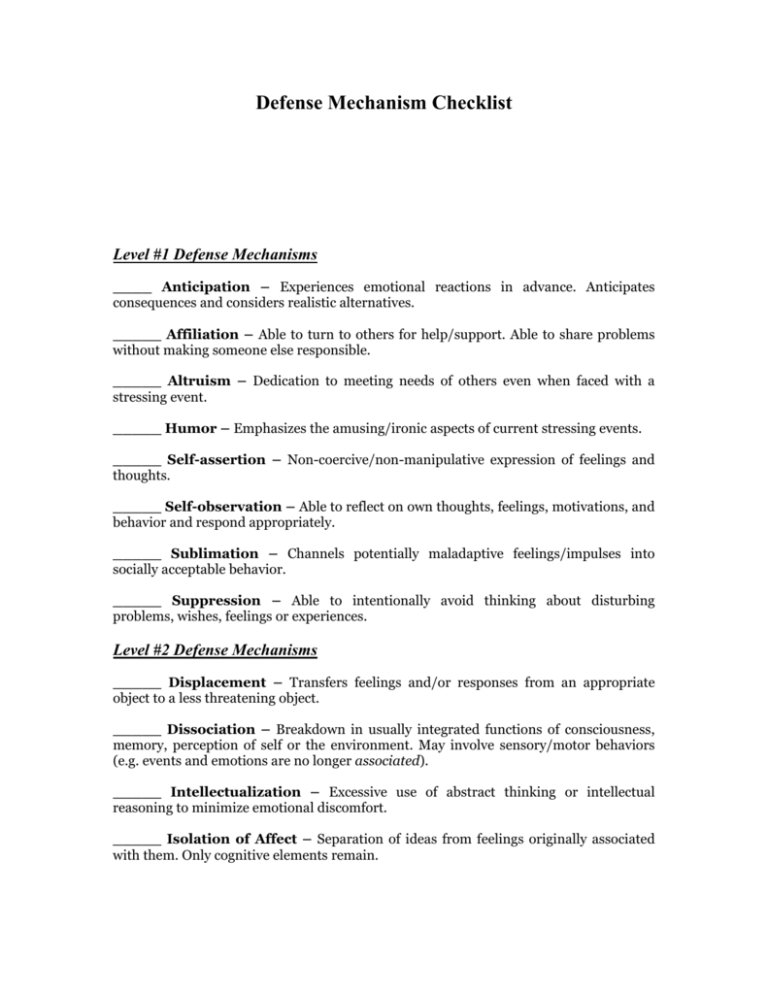
Defense Mechanism Checklist
Level #1 Defense Mechanisms
____ Anticipation – Experiences emotional reactions in advance. Anticipates
consequences and considers realistic alternatives.
_____ Affiliation – Able to turn to others for help/support. Able to share problems
without making someone else responsible.
_____ Altruism – Dedication to meeting needs of others even when faced with a
stressing event.
_____ Humor – Emphasizes the amusing/ironic aspects of current stressing events.
_____ Self-assertion – Non-coercive/non-manipulative expression of feelings and
thoughts.
_____ Self-observation – Able to reflect on own thoughts, feelings, motivations, and
behavior and respond appropriately.
_____ Sublimation – Channels potentially maladaptive feelings/impulses into
socially acceptable behavior.
_____ Suppression – Able to intentionally avoid thinking about disturbing
problems, wishes, feelings or experiences.
Level #2 Defense Mechanisms
_____ Displacement – Transfers feelings and/or responses from an appropriate
object to a less threatening object.
_____ Dissociation – Breakdown in usually integrated functions of consciousness,
memory, perception of self or the environment. May involve sensory/motor behaviors
(e.g. events and emotions are no longer associated).
_____ Intellectualization – Excessive use of abstract thinking or intellectual
reasoning to minimize emotional discomfort.
_____ Isolation of Affect – Separation of ideas from feelings originally associated
with them. Only cognitive elements remain.
_____ Reaction Formation – Substitution of “real” behaviors and thoughts with
those that are not from the client’s reality.
_____ Repression – Expelling of disturbing wishes, thoughts, or experiences from
consciousness. Emotions may remain.
_____ Undoing – Words or behaviors designed to negate/make amends symbolically
for unacceptable thoughts, feelings, or actions.
Level #3 Defense Mechanisms
____ Devaluation – Attributes grossly exaggerated negative qualities to self or others.
_____ Idealization – Attributes grossly exaggerated positive qualities others.
_____ Omnipotence – Projection of the image that one possesses special powers or
abilities. Superior to others.
Level #4 Defense Mechanisms
_____ Denial – Refusing to acknowledge some painful aspect of external reality or
subjective experience that would be apparent to others.
_____ Projection – Individual falsely attributes to another person their own
unacceptable feelings, impulses, or thoughts.
_____ Rationalization – Conceals the true motivations for thoughts, actions, or
feelings through the elaboration of reassuring or self-serving but incorrect explanations.
Level #5 Defense Mechanisms
_____ Autistic Fantasy – Excessive daydreaming as a substitute for human
relationships, more effective action, or problem solving.
_____ Projective Identification – Projection of feelings, impulses, or thoughts onto
another. Eventually, those feelings, impulses or thoughts are fulfilled in the party upon
whom they have been projected.
_____ Splitting – Compartmentalizing opposite affects. Not able to see good and bad
in something at the same time.
Level #6 Defense Mechanisms
_____ Acting Out – Physical action taken in response to internal reflections or
feelings. Acted out behavior is a direct response to the internal affective cues.
_____ Apathetic Withdrawal – Withdrawal from any attempts to deal with internal
or external stressing events of emotional states. The person gives up.
2
_____ Help Rejecting Complaining – Making repeated requests for help. When
help is offered, it is rejected.
_____ Passive Aggression – Indirect and unassertive aggression toward others.
Overt and visible compliance masks covert resistance, resentment and hostility.
Level #7 Defense Mechanisms
_____ Delusional Projection – Projection with the added component of belief that
the event or situation being projected is part of objective reality when in fact it is not.
_____ Psychotic Denial – Denial with the added component of belief that the event
or situation being denied can be verified to be false (e.g. denies wife has died and
continues to hear/see her).
_____ Psychotic Distortion – Internal efforts to reshape the external world with
hallucinations and delusions. Creation of a new reality.
Copyright © 2009. The American Association of Christian Counselors. All rights reserved.
3





